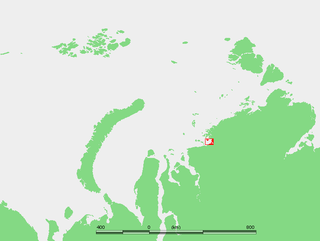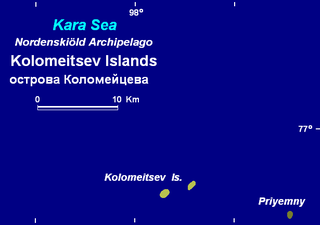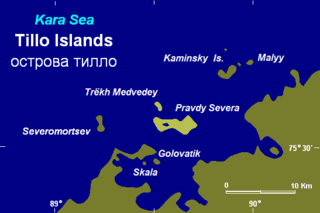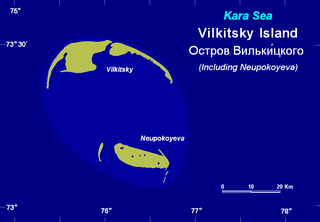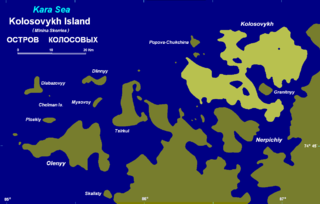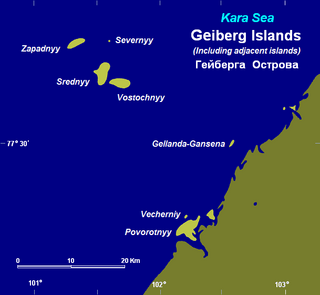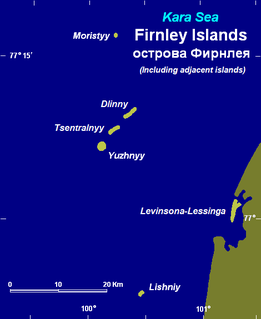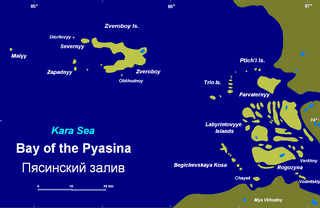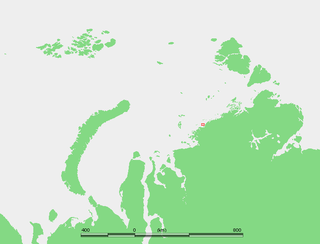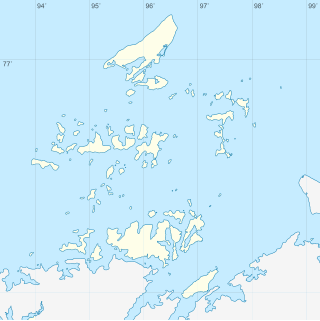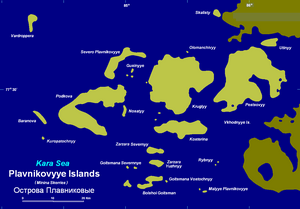

The Plavnikovye Islands (Russian: острова Плавниковые; Ostrova Plavnikovyye) is a group of islands, in the Kara Sea eastern region, off the coast of Siberia. These islands are covered with tundra vegetation and there are many lakes and swamps. They are under snow and ice during most of the year.

The Kara Sea is part of the Arctic Ocean north of Siberia. It is separated from the Barents Sea to the west by the Kara Strait and Novaya Zemlya, and the Laptev Sea to the east by the Severnaya Zemlya archipelago. It is named after the Kara River, which is now relatively insignificant but which played an important role in the Russian conquest of northern Siberia. The Kara River name is derived from Nenets word meaning "hummocked ice".

Siberia is an extensive geographical region spanning much of Eurasia and North Asia. Siberia has historically been a part of modern Russia since the 17th century.
The largest islands of the Plavnikovye Archipelago are Pestsovy Island and Krugly Island. Most of these islands are located and less than 10 km west of the deeply indented shores of the Taymyr Peninsula. But others, like Vardroppera Island, are far offshore. The eastern group of islands, including Kosterina and Pestsovy, are also known as Vkhodnye Islands.

The Taymyr Peninsula is a peninsula in the Far North of Russia, in the Siberian Federal District, that forms the northernmost part of the mainland of Eurasia. Administratively it is part of the Krasnoyarsk Krai Federal subject of Russia.
The Plavnikovye Islands, lie south of the small Kolosovykh peninsula. Geologically they are part of the Minina Skerries, a complex formation that includes the Kolosovykh Islands further north. This island group is located between 73° 15' and 74° 40' N and between 84° and 86° 30' E.

The Minina Skerries are located in the Kara Sea, in the northwestern shores of Siberia. They stretch between the Mikhailov Peninsula and the mouths of the river Pyasina. Their latitude is between 74° and 75° N, and their longitude between 84° and 87° 30' E.
The sea surrounding the Plavnikovye Islands is covered with fast ice in the winter and the climate is severe, with bitter and long winters. The surrounding sea is obstructed by pack ice even in the summer.
This island group belongs to the Krasnoyarsk Krai administrative division of the Russian Federation. It is also part of the Great Arctic State Nature Reserve, the largest nature reserve of Russia.

Krasnoyarsk Krai is a federal subject of Russia, with its administrative center in the city of Krasnoyarsk—the third-largest city in Siberia. Comprising half of the Siberian Federal District, Krasnoyarsk Krai is the largest krai in the Russian Federation, the second largest federal subject and the third largest subnational governing body by area in the world, after Sakha and the Australian state of Western Australia. The krai covers an area of 2,339,700 square kilometers (903,400 sq mi), which is nearly one quarter the size of the entire country of Canada, constituting roughly 13% of the Russian Federation's total area and containing a population of 2,828,187, or just under 2% of its population, per the 2010 Census.

The Great Arctic State Nature Reserve is a nature reserve in Krasnoyarsk Krai, Russia. With an area of 41,692 square kilometers (16,097 sq mi), it is the largest reserve of Russia and Eurasia, as well as one of the largest in the world.
The Plavnikovye Islands should not be confused with Plavnikovy Island (Ostrov Plavnikovy), off the western shores of Severnaya Zemlya, also in the Kara Sea.

Severnaya Zemlya is a 37,000-square-kilometre (14,000-square-mile) archipelago in the Russian high Arctic. It lies off Siberia's Taymyr Peninsula, separated from the mainland by the Vilkitsky Strait. This archipelago separates two marginal seas of the Arctic Ocean, the Kara Sea in the west and the Laptev Sea in the east.



